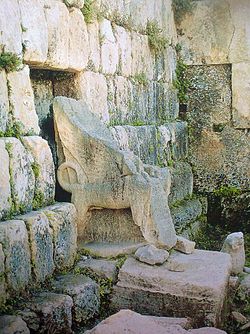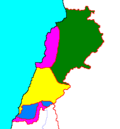Portal:Lebanon
The Lebanon PortalA view of Byblos, Lebanon
 Lebanon, officially the Republic of Lebanon, is a country in the Levant region of West Asia. Situated at the crossroads of the Mediterranean Basin and the Arabian Peninsula, it is bordered by Syria to the north and east, Israel to the south, and the Mediterranean Sea to the west; Cyprus lies a short distance from the coastline. Lebanon has a population of more than five million and an area of 10,452 square kilometres (4,036 sq mi). Beirut is the country's capital and largest city. Human habitation in Lebanon dates to 5000 BC. From 3200 to 539 BC, it was part of Phoenicia, a maritime civilization that spanned the Mediterranean Basin. In 64 BC, the region became part of the Roman Empire and the subsequent Byzantine Empire. After the seventh century, it came under the rule of different Arab Islamic caliphates, including the Rashidun, Umayyad and Abbasid caliphates. The 11th century saw the establishment of Christian Crusader states, which fell to the Ayyubids and the Mamluks. Lebanon came under Ottoman rule in the early 16th century. Under Ottoman sultan Abdulmejid I, the first Lebanese proto-state, the Mount Lebanon Mutasarrifate, was established as a home for Maronite Christians, as part of the Tanzimat reforms. Lebanon is a developing country, ranked 112th on the Human Development Index. It has been classified as a lower-middle-income country. The Lebanese liquidity crisis, coupled with nationwide corruption and disasters such as the 2020 Beirut explosion, precipitated the collapse of Lebanon's currency and fomented political instability, widespread resource shortages, and high unemployment and poverty. The World Bank has defined Lebanon's economic crisis as one of the world's worst since the 19th century. Despite the country's small size, Lebanese culture is renowned both in the Arab world and globally, powered primarily by the large and influential Lebanese diaspora. Lebanon is a founding member of the United Nations and the Arab League, and a member of the Non-Aligned Movement, the Organization of Islamic Cooperation, the Organisation internationale de la Francophonie, and the Group of 77. (Full article...) This is a Featured article, one of the best articles Wikipedia has to offer.
 The Temple of Eshmun (Arabic: معبد أشمون) is an ancient place of worship dedicated to Eshmun, the Phoenician god of healing. It is located near the Awali river, 2 kilometres (1.2 mi) northeast of Sidon in southwestern Lebanon. The site was occupied from the 7th century BC to the 8th century AD, suggesting an integrated relationship with the nearby city of Sidon. Although originally constructed by Sidonian king Eshmunazar II in the Achaemenid era (c. 529–333 BC) to celebrate the city's recovered wealth and stature, the temple complex was greatly expanded by Bodashtart, Yatonmilk and later monarchs. Because the continued expansion spanned many centuries of alternating independence and foreign hegemony, the sanctuary features a wealth of different architectural and decorative styles and influences. The sanctuary consists of an esplanade and a grand court limited by a huge limestone terrace wall that supports a monumental podium which was once topped by Eshmun's Greco-Persian style marble temple. The sanctuary features a series of ritual ablution basins fed by canals channeling water from the Asclepius river (modern Awali) and from the sacred "YDLL" spring; these installations were used for therapeutic and purificatory purposes that characterize the cult of Eshmun. The sanctuary site has yielded many artifacts of value, especially those inscribed with Phoenician texts, such as the Bodashtart inscriptions and the Eshmun inscription, providing valuable insight into the site's history and that of ancient Sidon. The Eshmun Temple was improved during the early Roman Empire with a colonnade street, but declined after earthquakes and fell into oblivion as Christianity replaced polytheism and its large limestone blocks were used to build later structures. The temple site was rediscovered in 1900 by local treasure hunters who stirred the curiosity of international scholars. Maurice Dunand, a French archaeologist, thoroughly excavated the site from 1963 until the beginning of the Lebanese Civil War in 1975. After the end of the hostilities and the retreat of Israel from Southern Lebanon, the site was rehabilitated and inscribed to the World Heritage Site tentative list. (Full article...) Did you know (auto-generated) -
TopicsRelated portalsReligions in Lebanon Arab states Other countries This is a Good article, an article that meets a core set of editorial standards.
Arab Christians (Arabic: ﺍﻟْﻤَﺴِﻴﺤِﻴُّﻮﻥ ﺍﻟْﻌَﺮَﺏ, romanized: al-Masīḥiyyūn al-ʿArab) are the Arabs who adhere to Christianity. The number of Arab Christians who live in the Middle East was estimated in 2012 to be between 10 and 15 million, although most predominant in Lebanon. Arab Christian communities can be found throughout the Arab world, but are concentrated in the Eastern Mediterranean region of the Levant and Egypt, with smaller communities present throughout the Arabian Peninsula and North Africa. The history of Arab Christians coincides with the history of Eastern Christianity and the history of the Arabic language; Arab Christian communities either result from pre-existing Christian communities adopting the Arabic language, or from pre-existing Arabic-speaking communities adopting Christianity. The jurisdictions of three of the five patriarchates of the Pentarchy primarily became Arabic-speaking after the early Muslim conquests – the Church of Alexandria, the Church of Antioch and the Church of Jerusalem – and over time many of their adherents adopted the Arabic language and culture. Separately, a number of early Arab kingdoms and tribes adopted Christianity, including the Nabataeans, Lakhmids, Salihids, Tanukhids, Ibadis of al-Hira, and the Ghassanids. In modern times, Arab Christians have played important roles in the Nahda movement, and they have significantly influenced and contributed to the fields of literature, politics, business, philosophy, music, theatre and cinema, medicine, and science. Today Arab Christians still play important roles in the Arab world, and are relatively wealthy, well educated, and politically moderate. Emigrants from Arab Christian communities also make up a significant proportion of the Middle Eastern diaspora, with sizable population concentrations across the Americas, most notably in Brazil, Argentina, Venezuela, Colombia, and the US. However those emigrants to the Americas, especially from the first wave of emigration, have often not passed the Arabic language to their descendants, having integrated into the majority-Christian communities to which they emigrated. (Full article...) General imagesThe following are images from various Lebanon-related articles on Wikipedia.
CategoriesAssociated WikimediaThe following Wikimedia Foundation sister projects provide more on this subject:
SourcesDiscover Wikipedia using portals |














































